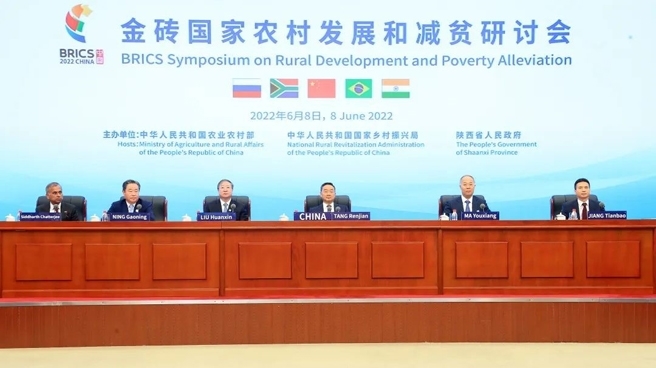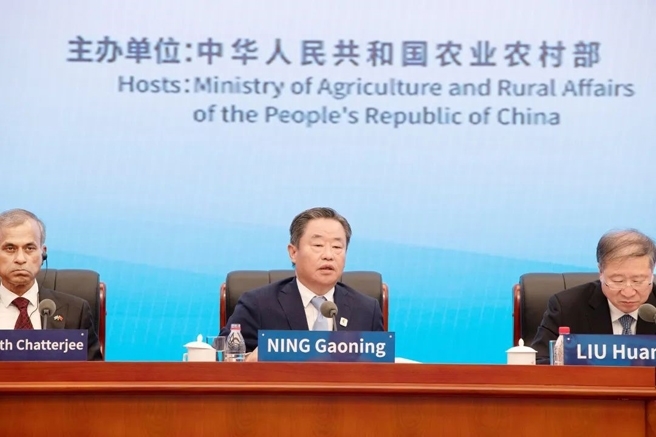Ning Gaoning Attends BRICS Symposium on Rural Development and Poverty Alleviation
On June 8, the 12th Meeting of BRICS Ministers of Agriculture was held via video conference. During the meeting, the BRICS Symposium on Rural Development and Poverty Alleviation was held to exchange experiences, promote consensus, explore potential opportunities, and discuss countermeasures and proposals to meet crisis-related challenges and achieve the UN 2030 Agenda for Sustainable Development.

The Chinese Minister of Agriculture and Rural Affairs Tang Renjian attended the opening ceremony and delivered a keynote speech. The Ministers of Agriculture from Brazil, Russia, India, and South Africa, Governor of Shaanxi Province Zhao Yide, and Deputy Prime Minister and Minister of Economic Development and Poverty Reduction of Uzbekistan, Jamshid Kuchkarov, were also present and delivered speeches. Ambassadors to China of some developing countries, representatives of universities and enterprises of BRICS countries, and representatives of relevant international institutions and organizations participated in the discussions. The establishment of the BRICS Agricultural and Rural Development Forum was announced at the Symposium. The Forum will provide a new mechanism and platform to further promote international exchange and cooperation in the field of agricultural and rural development in BRICS countries. Ning Gaoning, Chairman of Sinochem Holdings, was invited to attend the Symposium as a representative of Chinese enterprises, where he shared Sinochem Holdings’corporate practices.

Ning Gaoning introduced Syngenta Group, a subsidiary of Sinochem Holdings, and a globally leading company engaged in agricultural innovation and service, which pioneered and implemented the MAP (Modern Agriculture Platform) model in China and has played a vital role in poverty alleviation in the country. The Group was awarded the title “National Advanced Collective in Poverty Alleviation” by the Chinese government in 2021. By innovating ways to organize farmers and transforming service models, MAP empowers agriculture, rural areas, and farmers with science and technology, and promotes sustainable development of technology-based agriculture toward increasing the prosperity of the industry.
Its specific approaches include:
1. Select good seeds. County-based MAP service centers and demonstration farms are built to screen different quality seed varieties and promote application. The MAP service center in Funan County, Anhui Province selected 5 superior varieties from more than 100 currently cultivated varieties of wheat in the county and promoted them throughout the whole region, thereby building a 600,000 mu (40,000 hectares) high-quality wheat base. Wheat quality and stability have been greatly improved, with the incidence of gibberellic disease falling to 1.5% and the average yield exceeding 50 kg per mu (750 kg per hectare), which benefited nearly 50,000 farmers.
2. Promote advanced technology. Planting solutions applicable to different regions and crops for the entire growth cycle are developed based on local conditions and vigorously promoted among farmers. In Ar Horqin Banner, Inner Mongolia, MAP formulated planting solutions for farmers, promoted soil health and crop protection packages, and used digital tools to provide farmers with online field patrol, accurate weather forecasting, and pest and disease warning services. These efforts helped farmers save RMB 50 per mu (RMB 750 per hectare), increase yield by 200 kilograms per mu (3,000 kilograms per hectare) and income by RMB 450 per mu (RMB 6,750 per hectare).
3. Innovate methods. By integrating local resources and actively using financial and insurance tools, the Group is making efforts to explore various methods to help farmers increase their income. In Weixian County, Hebei Province, the MAP service center jointly established a cooperative with two village committees to provide farmers with whole-process services from planting to harvesting. At the same time, the center joined hands with financial institutions to provide loans, insurance, and other services to help farmers enjoy a minimum income of RMB 1,000 per mu (RMB15,000 per hectare). So far, a total of RMB 5 million of loans have been issued, with 30,000 mu (2,000 hectares) of farmland covered by insurance, leading to an average income increase of RMB 150 per mu (RMB 2,250 per hectare) for farmers and RMB 250 per mu (RMB 3,750 per hectare) for the village collective.
4. Supply quality products. The Group uses modern information technology such as blockchain to accurately record the production data of the entire agricultural chain and has created the MAP beSide whole-process quality traceability system to endorse and increase credit for high-quality agricultural products and help farmers build high-quality agricultural product brands. Through practices such as order-based planting, MAP has helped several regional high-quality agricultural products such as wheat from Funan and cherry tomatoes from Linxi to enter the bigger market, which has not only solved the sales problem, but also ensured fair price for high quality. These efforts have ensured farmers enjoy a 5%–20% premium in their income.
5. Cultivate qualified talents. MAP service centers conduct various training sessions on modern agricultural technology to empower farmers with useful techniques. Today, there are more than 2,000 agronomists working in teams in MAP service centers around the country, rooted in the front line of the countryside to carry out technical training and guidance. In Linxi County of Inner Mongolia alone, MAP has held a total of 52 training sessions for farmers and 29 on-site observation sessions in recent years, with 5,000 farmers attending the training.
Up to now, Syngenta Group a subsidiary of Sinochem Holdings, has built more than 500 MAP centers nationwide, 105 of which are in national-level poverty-eradication counties, directly serving 430,000 households. Through the MAP model, Sinochem Holdings hopes to promote the upgrade of agricultural industrialization, achieve sustainable development of science and technology-based agriculture, help modernize agriculture and rural areas, and consolidate and expand the effectiveness of poverty eradication. Currently, Sinochem Holdings is exploring the extension of this model to more countries and is looking at deepening international cooperation in poverty reduction. Striving to become an advocate, promoter, and contributor to the global poverty alleviation cause, Sinochem Holdings is working to provide solutions with Chinese characteristics to accelerate the realization of the UN 2030 Sustainable Development Goals.


 CN
CN PC
PC


